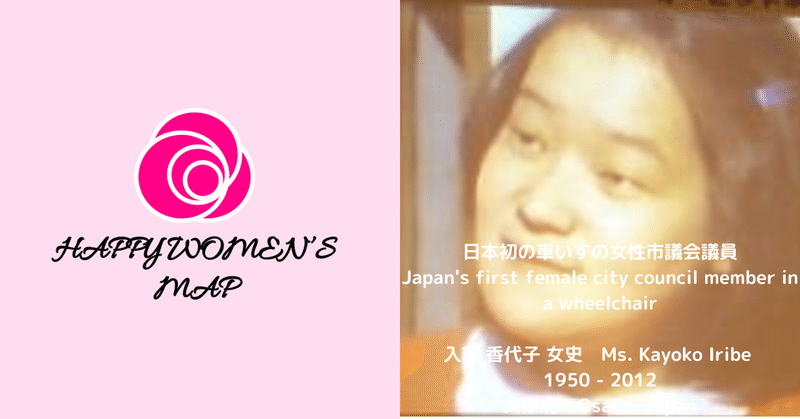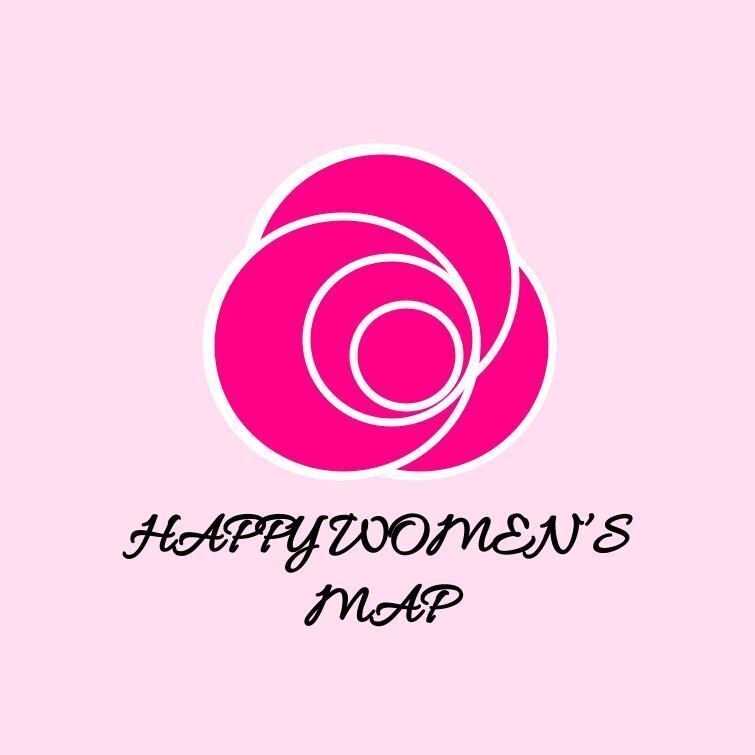
Happy Women's Map 大阪府寝屋川市 日本初の車いす女性議員 入部 香代子 女史 / The Japan's First Female City Councilor in a Wheelchair, Ms. Kayoko Iribe

「私は、いのちあるかぎり、生き生きした障害者運動の道を歩いたんねん」
"As long as I live, I will walk the path of a vibrant movement for people with disabilities!"
入部 香代子(旧姓 長沢香代子)女史
Ms. Kayoko Iribe
1950 - 2012
大阪府寝屋川市 生誕
Born in Neygawa-city, Osaka-fu
入部香代子女史は、日本初の車いすの女性市議会議員で、障害者解放運動の先駆者です。24時間介護と車いすが必要な脳性麻痺の重度障害者として、街で自立生活をしながら、障害者が就労できる場所づくりならびに街づくりに取り組みました。
Ms. Kayoko Iribe is Japan's first female city council member in a wheelchair, and a pioneer in the disability liberation movement. As a person with severe cerebral palsy requiring 24-hour care and a wheelchair, she worked towards creating places where people with disabilities can work and contributed to community development while leading an independent life in the city.
「かわいそう?」
香代子は1歳3か月の時に麻疹にかかり高熱が1カ月続いて脳性まひになります。母親は「何でこんな子」を産んだと責められ、香代子を家に閉じ込めます。やがて家で面倒を看られなくなった香代子は13歳から障害者施設に収容させられます。そして、障害児は就学免除・猶予で義務教育は受けなくてもよいとされ、学校に通う権利を奪われます。香代子は施設で青春時代を過ごします。20歳を過ぎた頃、施設時代をともに過ごした金満里に誘われ、CP(Cerebral Parlsy=脳性麻痺)の自立運動家団体「青い芝」の日常・生活・思想らをカメラに収めた映画「さようならCP(Cerebral Parlsy=脳性麻痺)」の上映運動、ならびに喫茶店やパチンコ屋やその他、街のいろんな所に障害者が行ったのをただ撮っただけの映画「カニは横に歩く」の制作活動に参加します。金満里また鎌谷正代とともに「青い芝」の優生保護法交渉・養護学校義務化反対運動・川崎バス闘争・和歌山センター闘争などの闘争に参加、「青い芝」の3烈女と恐れられます。
「そよ風のように街に出よう」
障害者解放運動から生まれた合言葉に誘われて、香代子は街に繰り出しアパート暮らしを始めます。香代子は介護者とデパートや映画に行く道々で「病院に行くの?どこの施設から?」など声をかけられ、「障害者用の設備がない」と入れてくれない喫茶店・美容院・町医者がほとんど。電車に乗ろうとすると「車いすの方はラッシュ時を避けて9時から5時までしか乗車できません」と駅員から注意される上に、車いすは荷物扱いされ荷物料金を取られます。その度に、香代子は駅員また店員と言い争いになります。それでも、香代子の脳性マヒの車椅子生活は、恋・妊娠・出産と、障害者の可能性をどんどん拡がります。香代子が妊娠すると、母親からは「あんたの体で赤ちゃん産んだらあんたが死んでしまう。子どももかわいそうや」、医師からは「産んでから誰が子どもの面倒をみるのか。堕ろしますか?堕ろすんでしょう?」の言葉をかけらます。
「あんたら健全者が何もせえへんかったら、わたしら障がい者は生きていかれへんのやで」
香代子は座談会などに積極的に参加して介護者を勧誘します。車いすに座って論争しながら、介護者がストローをさしたコップを口元に近づけるのをズズッと飲んだり、介護者が箱から1本取り出し指に挟んだ煙草を口にくわえて吸いこんだり、参加者には香代子と介護者との連携プレーがとても新鮮に映ります。香代子に「あんたも介護に来てや~」と声掛けされると、「え~、どうしたらええんやろ」と考える間もなくあれよあれよと介護に入ることになります。香代子は出産を決意すると同時に24時間介護を受けての生活を始めます。右も左も分からない二十歳前後の学生が入れ替わり立ち替わりやってきます。香代子は脳性麻痺の硬直をきつくさせながら、介護者ひとりひとりに対して、自分の体の洗い方、お尻の拭き方、着替えの仕方、流行の編み込み・巻き髪のセットの仕方、たばこのふかせかた、食事のメニュー、口への食事の運び方はじめなどを細かく指示します。介護者は朝8時からの昼介護と夕方7時からの泊り介護で1日2人体制、子供が生まれると昼間は2人に増員して1日3人体制。香代子は家事も育児も細かく指示しながら、自分と子どもの為に必死でスムーズな日常生活を確保します。
「地域であたりまえに生きる」
行き場がなく小規模作業所を自らの手で作り、親・教師・友人の手を借りて地域の中で必死に生きようと懸命に頑張る障害者たちを目にする中で、香代子は26歳の時に「障害者自立センター・AZの会」を立ち上げ、「AからZまでみんなが安心して暮らせる街を創ろうよ」と呼びかけます。豊中市の環境市民運動と密着しながら障害者の働く場をつくろうと考え、障害者と健常者が一緒に廃油を原料にして粉石けんをつくる作業を始めます。作業所ではなくて事業所として行政と助成金の交渉を続けながら、粉せっけんはじめ無添加パンを製造しながら、障碍者の自立トレーニング・人間関係づくり・地域での自立を促します。障害者の地域での生活を少しでも確保したいというみんなの願いを背負い、雇用促進法での助成金・売上・カンパ・内職・市の公園掃除の仕事で何とか職員の給料を払いながら、月によっては赤字をどうして埋めようかなど散々苦心しながら香代子は運営を続けます。
「困った状況にある人のことは何とかしなあかん」
41歳の香代子はAZの会ならびに市民団体の仲間に促され、豊中市議会議員に立候補します。香代子は自分が困っている介護・住宅問題・教育・障害者の就労といった問題を掲げ、豊中市で「全国初の車椅子の女性市会議員」となります。4期16年にわたる議員生活で、街や駅また市議会の場のバリアフリー化に尽力、豊中市の介護福祉体制の改善に力を注ぎます。香代子は府中市民からさまざまな相談を受けます。「死にたい」「殺される、もうだめ」電話を受けると、介護者をかけつけさせ、自分も助けにいきます。何年も風呂に入っていない障がい者、借金まみれの人、家族が皆精神的に病んでいく家など、支援が必要な相談者のために、香代子は脳性マヒの硬直をきつくさせながら、議員や市職員に怒ったりハッタリをかけたり説得力満点で訴え、時には介護者泣かせの支援体制をつくります。香代子は議員引退後も、一障害者市民として社会にメッセージを送り続けます。2次障がいで首・股関節・足の痛みならびに脳性まひの硬直がひどくなり、肝硬変が進行してトイレも困難になりながらも香代子は外出を続けます。やがてベッドでばかり過ごすようになりながらも、香代子は介護者に自分のやりたいことを伝えて「障がい者主体」を実践します。香代子は最後まで自分らしく生きることにこだわって「ちゃうねん、なんでやねん」を繰り返して62歳で逝去します。香代子が二日市安、楠敏雄とともに結成した「障害者の自立と政治参加をすすめるネットワーク」 は、現在の参議院議員、木村英子・舩後靖彦・天畠大輔・に至るまで活動を継続しています。
"Pitiful?"
Kayoko contracted measles at the age of 1 year and 3 months, and sustained a high fever for a month, resulting in cerebral palsy. Blamed by her mother for giving birth to such a child, Kayoko was confined to her home. Unable to be cared for at home, she was placed in a facility for people with disabilities at the age of 13. Disabled children were exempted from compulsory education and were not required to attend school, depriving them of the right to education. Kayoko spent her youth in the facility. Around the age of 20, invited by Kimimari, who shared her time in the facility, Kayoko participated in the screening campaign for the movie "Goodbye CP," which captured the daily life, activities, and thoughts of the cerebral palsy (CP) self-advocacy group "Blue Turf" on camera. She also took part in the production of the movie "Crabs Walk Sideways," which simply documented the activities of disabled people in various places such as cafes, pachinko parlors, and others around the city. Alongside Kimimari and Masayo Kamaya, Kayoko participated in various struggles, including negotiations on the Eugenic Protection Law, opposition to compulsory special schools, the Kawasaki Bus Struggle, and the Wakayama Center Struggle, earning them the reputation of the "Three Fierce Women of Blue Turf."
"Let's venture out into the city like a gentle breeze."
Inspired by the rallying cry born from the disability liberation movement, Kayoko ventures into the city and begins living in an apartment. On her way to department stores and movies with caregivers, she often encounters inquiries like, "Are you going to the hospital? Which facility are you from?" However, most cafes, beauty salons, and local doctors refuse entry, citing the lack of facilities for people with disabilities. When attempting to board a train, station staff caution her, saying, "Wheelchair users can only ride between 9 am and 5 pm, avoiding rush hours," and she is charged extra for her wheelchair as if it were luggage. Each time, Kayoko finds herself in arguments with station staff or store employees. Despite these challenges, Kayoko's life in a wheelchair due to cerebral palsy expands with love, pregnancy, and childbirth, showcasing the increasing possibilities for people with disabilities. When Kayoko becomes pregnant, her mother warns her, saying, "If you give birth with your body, you'll die. The child will suffer too." Additionally, doctors suggest, "Who will take care of the child after birth? Shall we terminate the pregnancy? You'll probably terminate it, right?" These are the words she has to face.
"If you healthy folks don't do anything, us people with disabilities can't survive."
Kayoko actively participates in panel discussions and actively recruits caregivers. While seated in her wheelchair, she engages in debates, sipping through a straw from a cup held by a caregiver, or puffing a cigarette between their fingers. The coordination between Kayoko and her caregivers appears remarkably fresh to the participants. When Kayoko approached you, "Why don't you come help me?", without much thought, you find yourself helping Kayoko. Simultaneously deciding to give birth, she begins a life receiving 24-hour care. Inexperienced students in their early twenties come and go one after another. Despite the stiffness caused by cerebral palsy, Kayoko provides detailed instructions to each caregiver, including how to wash her body, wipe her bottom, change clothes, set trendy braids or curls, smoke a cigarette, plan meals, and deliver food to her mouth. Caregivers operate on a two-person shift for daily care from 8 am to noon and overnight care from 7 pm, with an additional person during the day when the child is born, creating a three-person shift. Kayoko meticulously instructs caregivers on household chores and child-rearing, striving to ensure a smooth daily life for herself and her child.
"Living Naturally in the Community."
Witnessing the efforts of people with disabilities who, with no place to go, create small workshops with their own hands and strive to live desperately within the community with the help of parents, teachers, and friends, Kayoko establishes the "Disability Self-Reliance Center, AZ Association" at the age of 26. She calls for creating a town where everyone can live with peace of mind, from A to Z. Collaborating closely with the environmental citizen movement in Toyonaka City, she envisions creating workplaces for people with disabilities. They begin a project where both disabled and non-disabled individuals work together to produce powdered soap from recycled oil. Navigating negotiations with the administration and seeking subsidies as a business rather than just a workshop, they continue to manufacture products such as powdered soap and additive-free bread. Simultaneously, they encourage the independence of disabled individuals through training, building relationships, and promoting self-reliance within the community. Bearing the collective wish to secure even a small part of the disabled community's life, Kayoko struggles to manage operations, covering staff salaries with subsidies from the Employment Promotion Law, sales, donations, side jobs, and municipal park cleaning jobs. Managing the organization involves persistent efforts, grappling with deficits in some months and brainstorming ways to cover them.
"In situations where people are in trouble, we must do something."
At the age of 41, prompted by colleagues from AZ Association and civic organizations, Kayoko runs for the Toyonaka City Council. Highlighting issues such as caregiving, housing problems, education, and employment for people with disabilities, she becomes the "first female wheelchair-using city councilor in the country" in Toyonaka City. Over four terms spanning 16 years as a councilor, she dedicates herself to making the city, stations, and the city council barrier-free and strives to improve the caregiving and welfare system in Toyonaka City. Kayoko receives various consultations from citizens in the city. When receiving calls like "I want to die" or "I'm being killed, it's hopeless," she dispatches caregivers and personally goes to help. For those in need of support, such as disabled individuals who haven't bathed in years, people drowning in debt, or families facing mental health challenges, Kayoko, despite the stiffness caused by cerebral palsy, passionately appeals to council members and city officials with a mix of anger, bluffing, and compelling arguments. At times, she creates support systems that bring caregivers to tears. Even after retiring as a councilor, Kayoko continues to send messages to society as a disabled citizen. Despite worsening pain in her neck, hip joints, and legs due to secondary disabilities, along with progressing liver cirrhosis that makes using the toilet difficult, Kayoko continues to go out. Eventually spending more time in bed, she practices "disability-led" care by communicating her preferences to caregivers. Kayoko persists in living true to herself, repeatedly saying "No, why?" and passes away at the age of 62.
The network for "Promoting the Independence and Political Participation of People with Disabilities," formed by Kayoko, Yasushi Nanko, and Toshio Kusunoki, continues its activities, with members such as current members of the House of Councillors, Hideko Kimura, Yasuhiko Funago, and Daisuke Amahata.
-CIL豊中(豊中自立支援センター)
-障害者の自立と政治参加をすすめるネットワーク

Share Your Love and Happy Women's Story!
あなたを元気にする女性の逸話をお寄せください!
Share your story of a woman that inspires you!
この記事が気に入ったらサポートをしてみませんか?
